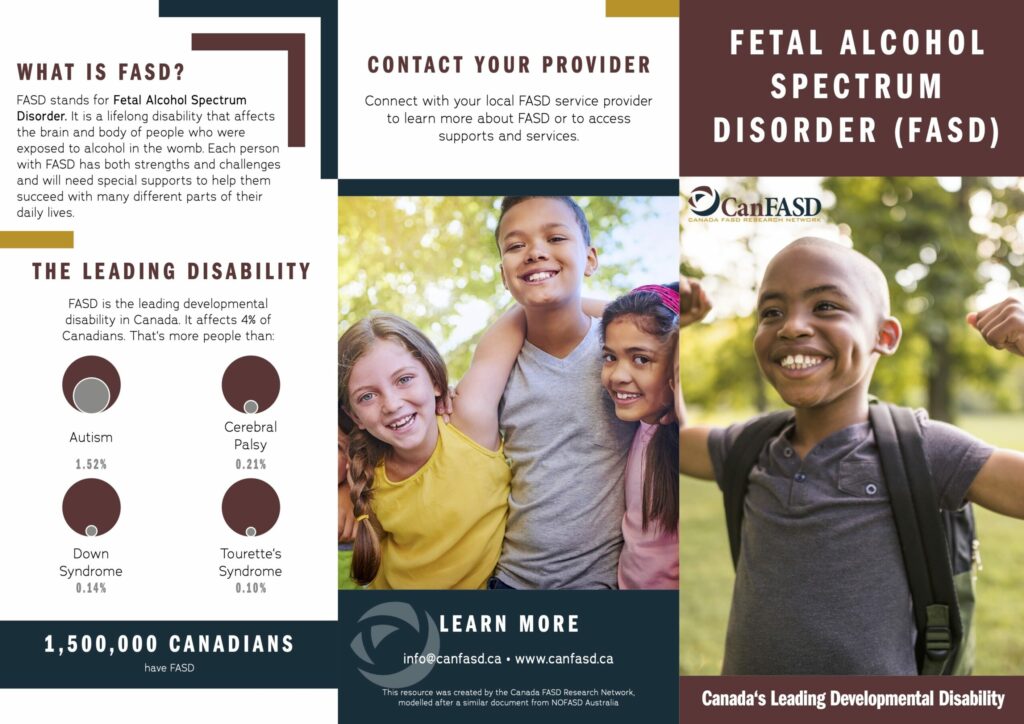What is FASD?
FASD stands for Fetal Alcohol Spectrum Disorder. It is a lifelong disability that affects the brain and body of people who were exposed to alcohol in the womb. Each person with FASD has both strengths and challenges and will need special supports to help them succeed with many different parts of their daily lives.
CanFASD released an evidence-based standard definition of FASD in Canada in 2019. We recommend researchers, policy makers, and service providers use this definition when talking about FASD.
These tri-fold brochures are available to download as a pdf, and we encourage groups to print them and make them available in their communities.
Quick FASD Facts
- FASD impacts approximately 4% of Canadians.
- FASD impacts more people in Canada than Autism Spectrum Disorder, Cerebral Palsy, and Down syndrome combined.
- Individuals with FASD are known for having a number of different strengths, including being friendly, likeable, affectionate, determined, hard-working, forgiving, non-judgemental and caring.
- Approximately 90% of individuals with FASD will experience at least one mental health issue in their lifetime.
- The social and economic cost of FASD in Canada is estimated to be $1.8 billion annually.
- Individuals with FASD achieve positive outcomes if their needs and challenges are addressed early on in life and they have access to supports that carry into adulthood.
The Basics of FASD
Just starting to learn about FASD? You’ve come to the right page! Check out these resources to get you up to speed on fetal alcohol spectrum disorder in Canada.
FASD Across Canada
Researchers currently estimate that at least 4% of the population of Canada has FASD, which translates to more than 1.5 million people. FASD is often underrecognized and identified, leading to the possibility that prevalence estimates are conservative.
Strategies and Frameworks
FASD is a uniquely complex disability. We need a coordinated, multi-disciplinary approach to address FASD and all of the intersecting complexities of this disability at a national, provincial, territorial, and local level. A national framework for FASD in Canada was proposed in 2022. The bill is currently under review in the Senate of Canada.
There are currently some provinces that have an operating strategy or framework in place to address FASD. But many are out of date, indirectly refer to FASD, or do not explicitly refer to FASD. FASD Across Canada is a report outlining the current state of strategic plans and awareness campaigns across Canada to highlight where strategic plans and FASD specific supports are needed.
Diagnostic Supports
In order to diagnose FASD, individuals are assessed by a multidisciplinary team of experts. There are diagnostic clinics scattered throughout the country, but despite FASD being 2.5 times more common than autism, some provinces don’t even have a diagnostic clinic available. This is why we are pushing for a National Framework for FASD: to make diagnostic supports more consistent across the country. Learn more about diagnosis and find a diagnostic clinic near you.
Treatment of FASD
FASD is a lifelong disorder. There is no cure, but early and appropriate supports can make a positive impact and improve outcomes for individuals with FASD. When we talk about “treatment” of fetal alcohol spectrum disorder, we are referring to those supports, or lifespan interventions.
The Towards Healthy Outcomes framework shows how you can structure your intervention approach to meet key needs across the lifespan, including physical wellbeing, attachment and relationships, social competency, mental wellness, skill building, identity, interdependence, employment, housing, and parenting.
This video from the Saskatchewan Prevention Institute provides basic information on how to support young children with diagnosed or undiagnosed FASD.
There are FASD clinics across Canada that offer supports and services for people diagnosed with FASD.
Individuals with FASD may also be prescribed medication to reduce the symptoms they experience. This evidence-based algorithm can guide clinicians when prescribing medication for people with FASD.


